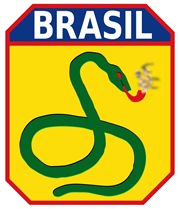Blog
Popular Brazilian idioms that will make you sound like a native speaker
- Wednesday February 24th, 2021
- Posted by: Amanda Ennes
- Category: Learn the Portuguese Language and Portuguese Grammar

Brazilian Portuguese is a rich language with many variants, slang, expressions, and popular Brazilian idioms. Furthermore, in Brazil, people tend to use informal speech a lot in everyday settings.
In this article, you are going to learn a few popular Brazilian idioms and the history behind them. Check it out!
Table of Contents
ToggleA cobra vai fumar (The snake is going to smoke)
 A situation is about to get really ugly.
A situation is about to get really ugly.
During World War II, it was common to hear that it would be easier for a snake to smoke than for Brazil to enter the war. But we did. The Brazilian army helped the US troops in Italy. Because of this, Brazilian soldiers adopted the symbol of a snake smoking a pipe to represent Brazil in the war.
Example in Portuguese:
É melhor não brigar com seu pai, senão a cobra vai fumar.
A vaca foi pro brejo (The cow went to the swamp)
When a situation that was initially positive goes bad.
This idiom goes back to the time of drought on large cattle farms when the cows moved toward lakes and swamps looking for water. Thus, they used to get bogged down and end up dying.
Example in Portuguese:
Tudo ia bem até nosso carro enguiçar no meio da estrada. Aí a vaca foi pro brejo.
Amigo da Onça (Friend of the jaguar)
Phony friend.
In the 1960s, there was a famous character from a comic strip called Amigo da Onça. He was unreliable and put his friends in unpleasant situations.
Example in Portuguese:
Se eu fosse você, não contava seus segredos para Maria. Ela é uma amiga da onça.
Arroz de festa (Rice of the party)
 Someone who shows up at every party.
Someone who shows up at every party.
During the 14th century, rice pudding was a mandatory dessert at parties in Portugal and Brazil. That is why those people who liked to be in every social event were compared to the rice back then.
Example in Portuguese:
Gustavo vai em todas as festas do Rio de Janeiro. Ele é muito arroz de festa.
As paredes têm ouvidos (The walls have ears)
People can be heard without knowing it.
This same expression can be found in German, French, and Chinese. It has its origins in medieval castles, where ducts and secret openings on the walls used to facilitate the hearing of political gatherings in closed rooms.
Example in Portuguese:
– Quero te contar um segredo.
– Fale baixo, as paredes têm ouvidos.
Fazer vaquinha (To make a small cow)
To raise some amount of money between friends and family to help someone.
This is one of the most popular Brazilian idioms ever. The expression was created Vasco da Gama supporters in 1920. The fans used to collect money among themselves to give to the players in case of victory. By that time, the Brazilian currency was called the old Real. The total amount of 25,000 réis was nicknamed “cow”.
Example in Portuguese:
Nós vamos fazer uma vaquinha para te ajudar com as despesas médicas.
Não adianta chorar pelo leite derramado (It is no use crying over spilled milk)
 It is pointless to regret something that has happened and cannot be changed.
It is pointless to regret something that has happened and cannot be changed.
There is a tale about a peasant woman carrying a bucket of milk over her head while thinking about what she would do with the money she would make from selling the milk. She stumbles and loses all her product, coming to the conclusion that it is not worthed it to be sad about a situation that has already happened and can no longer be changed.
Example in Portuguese:
Gustavo não quis estudar direito o ano todo e está prestes a repetir o ano na escola. Agora não adianta chorar pelo leite derramado.
Pensar na morte da bezerra (Mourn the death of the calf)
Be distracted or thoughtful.
This expression originates from a Hebrew story about King Absalom. The king would sacrifice calves as an offer to God. One of his sons was very fond of one of the calves, but Absalom sacrificed it anyway. The story tells that since the calf’s sacrifice, the king’s son spent the rest of his life sad and recluded, thinking about the death of the animal.
Example in Portuguese:
O está fazendo aí parado? Está pensando na morte da bezerra?
Pode tirar o cavalinho da chuva (Take the horse out of the rain)
To make someone give up on something.
People used to ride horses as their main means of transportation back then. When they went to visit someone with any intention of staying long, they would leave their horse unprotected outside. However, but if they were invited to stay longer, they would put the animal somewhere that would protect it if it rained.
Example in Portuguese:
– Posso dormir na sua casa hoje?
– Pode tirar o seu cavalinho da chuva.
Puxa-saco (Pull bag; the apple-polisher)
Someone who flatters people on a higher rank as means of attempting to achieve promotion or favor.
In the military service, low-ranking soldiers had to carry the bags from their superiors while traveling.
Example in Portuguese:
Sabrina é puxa-saco. Ela sempre elogia o chefe para ganhar uma promoção.
Sair a francesa (To sneak out like French people)
To leave without anyone noticing and/or without saying goodbye to anyone.
This idiom arose in England because of a feud between English and French people. English people would say the French were rude and left parties without saying goodbye to others.
Example in Portuguese:
Tinha muita gente na festa, então saí à francesa.
Santo do pau oco (Hollow wooden saint)
 Phony person. Someone who pretends to be something they are not.
Phony person. Someone who pretends to be something they are not.
During the colonial period of Brazil, the Portuguese crown applied high taxes on gold and other wealth. So, to get away from those taxes, miners used to hide gold and gemstone on the inside of the statues of saints carved in hollow wood.
Example in Portuguese:
Não confie em Pedro. Ele é um santo do pau oco.
Uma andorinha só não faz verão (One swallow bird does not make a summer)
Working together is more productive than working alone.
Centuries ago, the Greek philosopher Aristotle wrote “one swallow does not make a summer”. Some versions also mention spring, but this does not change the meaning behind the phrase. What Aristotle meant was that a human being cannot be judged by an isolated act, because that does not define him entirely.
However, in Brazil, we say that “uma andorinha só não faz verão” to express one person alone cannot do much and that working together is much more productive.
Example in Portuguese:
Você acha que vai conseguir construir uma casa sozinho? Uma andorinha só não faz verão.
171 – Um, sete, um (One, seven, one)
 Someone who employs fraudulent or unscrupulous methods to obtain money or any other advantage.
Someone who employs fraudulent or unscrupulous methods to obtain money or any other advantage.
This expression refers to Article 171 of the Brazilian Penal Code. The text stipulates: “Obtaining for yourself or for others an illegal advantage to the detriment of others, inducing or keeping someone in error, by artifice, trick, or any other fraudulent means.”
Example in Portuguese:
Jorge foi preso por roubar um carro. O irmão dele é outro 171.
Other popular Brazilian idioms and slang
If you want to learn more about Brazilian informal speech and slang, check our blog post The ultimate list of carioca slang! and have fun.
Moreover, you should consider signing up for Portuguese classes at Caminhos Language Centre and study Portuguese in a fun and exciting environment. At our classes, you will speak Portuguese from day one. Our native teachers also use experiences of daily life to teach Portuguese, helping students grasp the Brazilian street talk, important when learning to navigate the streets of Rio.


 Deutsch
Deutsch Français
Français Português
Português Español
Español

Em 1920, a moeda do Brasil era o Real, no plural RÉIS. E NÃO CRUZEIRO que sou foi criado após a segunda guerra.
Obrigada. Consertamos.
Cuanto sale el curso inicial intensivo y cuando puedo empezar.
Oi Adriana, vamos te enviar um email.